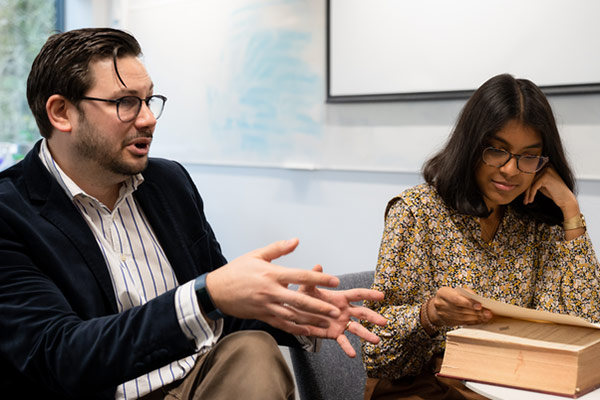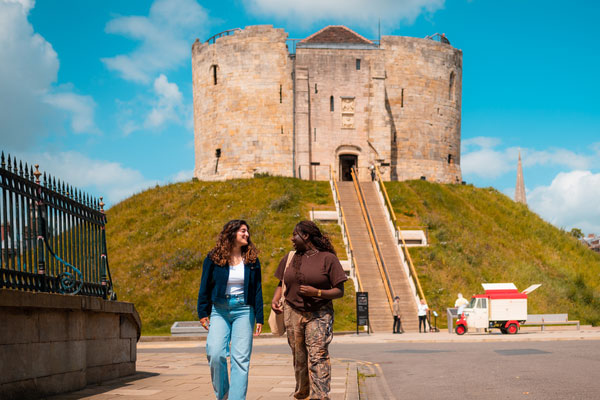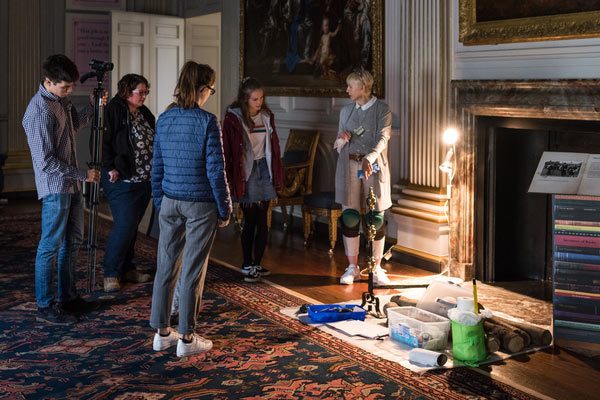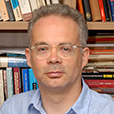
Address the key political and social challenges facing the world today
Year of entry: 2024 (September)
1 year full-time,
2 years part-time
September 2024 (semester dates)
Join us online or in person to find out more about postgraduate study at York.
Upcoming eventsThe world needs better politics: better ways of distributing resources and resolving conflicts.
How can we do this when our engagement with politics is most often local and national? The politics of the future is haunted by those of the past. In order to imagine and move towards building a new future, an understanding of history must underpin national and international politics.
This interdisciplinary MA seeks to address these problems by bringing together politics and contemporary history, with a particular focus on transnational ideas and institutions.
You'll benefit from a wide range of expertise across two outstanding departments, as well as access to numerous centres and institutes, including:

 The MA in Contemporary History and International Politics gave me a great opportunity to study fascinating topics which are still relevant today. The flexibility to choose both History and Politics modules allowed me to build a course that was best suited to my interests. Staff were very supportive in allowing me to pursue my topic of choice during the final dissertation.Alex, MA Contemporary History student
The MA in Contemporary History and International Politics gave me a great opportunity to study fascinating topics which are still relevant today. The flexibility to choose both History and Politics modules allowed me to build a course that was best suited to my interests. Staff were very supportive in allowing me to pursue my topic of choice during the final dissertation.Alex, MA Contemporary History student
History's research was ranked 11th in the UK and third nationally for the impact of its research in the Times Higher Education’s ranking of the latest REF results (2021). Also, 87.5 per cent of their research impacts were rated at 4* - REFs highest rating.
Politics are ranked in the UK top ten for the quality of our research outputs and our research environment - the support they give to their researchers - according to the Times Higher Education’s ranking of the latest REF results (2021)
The course consists of:
You can opt to take two skills modules or a placement instead of one taught option module.
You will also study three option modules:
Our modules may change to reflect the latest academic thinking and expertise of our staff, and in line with Department/School academic planning.
You will write a dissertation of between 14,000 - 16,000 words on a topic of your choice. Using source materials and analysis techniques, you will draft up the findings into an independently researched dissertation.
You will receive support, advice and guidance from your dissertation adviser throughout your project. The range of expertise of our staff and of our source materials means we can provide you with guidance on a wide range of topics.
You will have five one-to-one meetings with your dissertation adviser across Semester 2 and the summer period (June/July). In these meetings, you will discuss the feasibility of your project and receive feedback on two draft chapters of your dissertation.
Every course at York is built on a distinctive set of learning outcomes. These will give you a clear understanding of what you will be able to accomplish at the end of the course and help you explain what you can offer employers. Our academics identify the knowledge, skills, and experiences you'll need upon graduation and then design the course to get you there.
| Study mode | UK (home) | International and EU |
|---|---|---|
| Full-time (1 year) | £10,590 | £23,900 |
| Part-time (2 years) This is the year 1 fee. Fees for future years are subject to confirmation. |
£5,295 | £11,950 |
Students on a Student Visa are not currently permitted to study part-time at York.
For courses which are longer than one year, the tuition fees quoted are for the first year of study.
UK (home) or international fees? The level of fee that you will be asked to pay depends on whether you're classed as a UK (home) or international student. Check your fee status.
Find out more information about tuition fees and how to pay them.
There is no obligation to purchase books or other texts - all core texts and resources will be available in our library or online.
Discover your funding options to help with tuition fees and living costs.
We'll confirm more funding opportunities for students joining us in 2024/25 throughout the year.
If you've successfully completed an undergraduate degree at York you could be eligible for a 10% Masters fee discount.
You can use our living costs guide to help plan your budget. It covers additional costs that are not included in your tuition fee such as expenses for accommodation and study materials.
You’ll work with world‐leading academics who’ll challenge you to think independently and excel in all that you do. Our approach to teaching will provide you with the knowledge, opportunities, and support you need to grow and succeed in a global workplace.
Most of your modules will consist of weekly two-hour seminars. The Research Training module will be taught through three-hour workshops. You will normally work in small groups of fewer than 20 students.
We are home to the , a major archive repository in Britain. It holds the records of the Archbishopric of York from the early thirteenth century onwards, and specialises in the study of ecclesiastic institutions.
There are several other important archives housed at York, including the JB Morrell Library and the Raymond Burton Library for Humanities Research. These contain collections covering subjects such as the British Civil Wars, French Revolution and Modern Asian history. Find out more about our libraries.
You will be based in the Department of History in Vanbrugh College on Campus West. Most of your teaching will take place in or close to Vanbrugh College.
You will also get the opportunity to visit and be taught at local museums and heritage sites close to the city.
Our beautiful green campus offers a student-friendly setting in which to live and study, within easy reach of the action in the city centre. It's easy to get around campus - everything is within walking or pedalling distance, or you can always use the fast and frequent bus service.
You will be primarily assessed by essays and your dissertation. You will have the chance to submit assignments for formative assessment, enabling you to get and use feedback before the final summative assessment.


While completing your MA, you will gain essential skills in research, presentation and analysis. These skills are invaluable for progressing to a PhD and for a diverse range of careers.
| Typical offer | |
|---|---|
| Undergraduate degree | 2:1 or equivalent in History or a related discipline |
| International pre-masters programme | Pre-masters from our International Pathway College |
| Other international qualifications | Equivalent qualifications from your country |
If English isn't your first language you may need to provide evidence of your English language ability. We accept the following qualifications:
| Minimum requirement | |
|---|---|
| IELTS (Academic and Indicator) | 7.0, minimum 6.5 in each component |
| Cambridge CEFR | C1 Advanced: 185, with 176 in each component |
| Oxford ELLT | 8, minimum 7 in each component |
| Duolingo | 130, minimum 120 in all other components |
| LanguageCert SELT | C1 with 33/50 in each component |
| LanguageCert Academic | 75 with a minimum of 70 in each component |
| KITE | 495-526, with 459-494 in all other components |
| Skills for English | C1: Pass overall, with Pass in each component |
| PTE Academic | 67, minimum 61 in each component |
| TOEFL | 96, minimum 23 in each component |
| Trinity ISE III | Distinction in all component |
For more information see our postgraduate English language requirements.
You may be eligible for one of our pre-sessional English language courses. These courses will provide you with the level of English needed to meet the conditions of your offer.
The length of course you need to take depends on your current English language test scores and how much you need to improve to reach our English language requirements.
After you've accepted your offer to study at York, we'll confirm which pre-sessional course you should apply to via You@York.
Get in touch if you have any questions

Department of History, Department of Politics and International Relations

We offer a range of campus accommodation to suit you and your budget, from economy to premium.

Explore campus and city life and hear what our current students have to say about living here.

Lively, full of culture and beautiful, York is regularly voted one of the best places to live and visit in the UK.

Find out more about York. Chat to staff and students and take the tour, on campus or online.